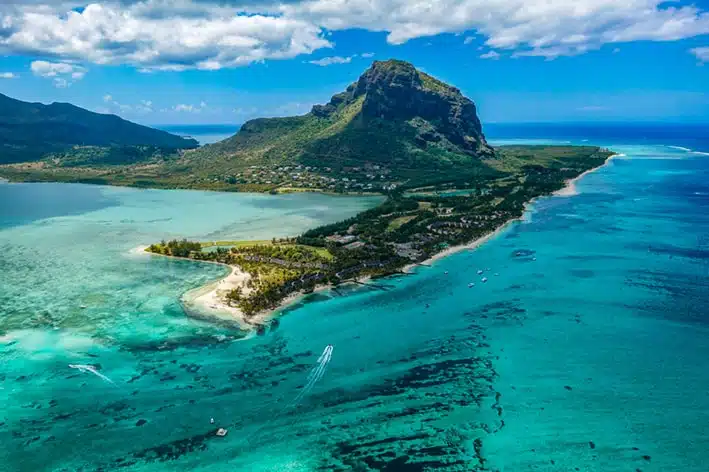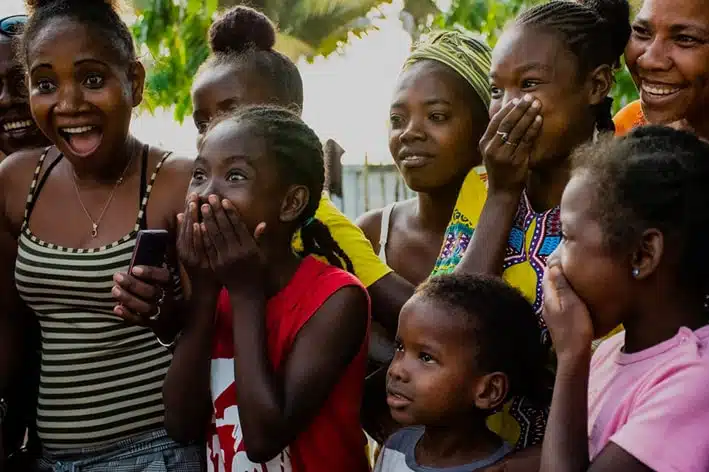As the world’s oceans daily absorb the impact of our cosmetic choices, selecting an ocean-friendly sunscreen is more than a simple choice: it’s imperative to safeguard our invaluable marine ecosystems. Discover the criteria for an informed choice that honors and protects our oceans.
Our oceans are flooded yearly with 25,000 tons of sunscreen, a continuous flow of 48 liters every minute. These figures, revealed by the Foundation for Nature and Man, are striking enough to make us think about the impact of our daily actions. Imagine, during a simple swim at the beach, nearly a quarter of the sunscreen we generously applied evaporates and mixes with the water in just 20 minutes. In destinations like the Vanilla Islands, where beach tourism and water activities are part of the experience, the impact of sunscreens is even more palpable.
The concern does not stop simply at the quantity of sunscreen poured out but extends deeply to the consequences of its ingredients, particularly the chemicals it contains. Oxybenzone, for example, is one of the many components found in these lotions. Its effects on marine ecosystems are devastating. Studies show that these compounds, even at low concentrations, can severely disrupt the growth and regeneration of corals. This disruption often manifests as coral bleaching, a phenomenon that makes them vulnerable to disease and can ultimately lead to their death.
Thus, what we often consider as a simple protective measure for ourselves has far broader and deeper repercussions, affecting the delicate balance of our precious marine ecosystems.
The Hidden Dangers of Our Creams
The impact of sunscreens does not stop at oxybenzone. In 2020, the Palau Islands, a sanctuary for more than 700 species of corals, banned oxybenzone, octocrylene, and parabens. With a fine of 1,000 dollars for violators, other regions, including Hawaii, Thailand, and some areas in the United States and Latin America, have followed suit.
Moreover, the microplastics present in many sunscreens are a growing concern. These tiny particles are often consumed by plankton, leading to contamination that extends throughout the food chain.
The Path to Safer Solutions
Fortunately, organizations like Haereticus Environmental Lab and the Environmental Working Group publish guides to help us choose environmentally friendly sunscreens. Mineral-based creams, such as titanium dioxide and zinc oxide, are preferable. Additionally, avoid creams containing nanoparticles, which are harmful to corals.
In the Vanilla Islands, where the marine fauna and flora are integral to the tourist attraction, visitors must be well informed and guided towards environmentally friendly choices.
The Key to Biodegradability
The concept of biodegradability has become a fundamental pillar in the quest for environmentally friendly sunscreens. A “biodegradable” sunscreen should, in theory, naturally decompose, thereby minimizing its impact on the marine environment. To bear this label, a cream must have a biodegradability rate of at least 70%.
However, there are challenges to overcome. The main obstacle is the need for more strict regulations and formal tests to verify these biodegradability claims. Without clear standards, it is easy for brands to make misleading or exaggerated claims. But not everything is bleak; the cosmetic industry, recognizing the growing concerns of consumers, is rapidly evolving. Many avant-garde brands are now developing more natural, transparent, and, most importantly, marine biodiversity-respecting formulas. These initiatives give hope for a future where sunbathing does not mean compromising the health of our oceans.
Protect Without Polluting: Your Selection Guide
For travelers heading to the Vanilla Islands, here are some recommendations for enjoying the sun while preserving the natural beauty of these destinations:
Mineral UV Filters: Sunscreens containing titanium dioxide and zinc dioxide are preferable. These minerals are not toxic to humans or the environment.
Biodegradability: The more natural a sunscreen, the better. Organic creams, certified by Ecocert, are particularly recommended.
Responsible Packaging: Opt for products packaged in recyclable or biodegradable materials.
Top 6 Ocean-Friendly Sunscreens
Koko Dezile: Proudly made in Mauritius, this cream is reef-safe and formulated with healthy ingredients that respect marine ecosystems, with 100% recyclable packaging.
SeventyOne Percent: Founded by passionate surfers, it offers creams made in France, rich in natural ingredients, and free from nanoparticles. Their innovative packaging is partly made from recycled milk bottles.
Laboratoires de Biarritz: Favored by surfers, their organic Alga Maris range is made exclusively from biodegradable ingredients. Additionally, they collaborate with Respect Ocean to maintain the highest standards in ocean protection.
Biotherm – WaterLover: Biotherm has been committed to preserving marine life for nearly a decade with its WaterLover range. In addition to its biodegradable formula, the packaging is 100% recycled, emphasizing the brand’s priority to minimize its ecological footprint.
Typology: This sunscreen offers SPF30 protection with a natural and moisturizing formula. Free from nanoparticles and chemical filters, Typology succeeds in combining efficacy and respect for nature.
Sol de Ibiza: Combining tradition and innovation, this brand uses aloe vera from the Balearic Islands, ensuring a gentle and effective product. Using aluminum packaging and 100% natural ingredients, Sol de Ibiza stands as an ethical reference.
The Importance of Educating and Raising Awareness
At a time when environmental awareness is at its peak, education, and awareness play a central role in preserving our planet. Each choice we make every product we purchase, has a direct or indirect repercussion on our environment. Sunscreens are particularly concerning among these choices due to their direct interaction with marine ecosystems.
Making an informed choice means not only taking care of our skin against the harmful effects of UV rays. It also means recognizing our role and responsibility as guardians of the Earth. By opting for ocean-friendly products, we actively preserve the beauty and health of our precious marine ecosystems.








